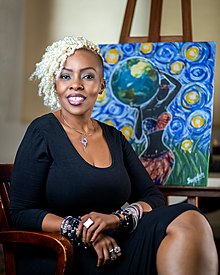
"Mungu ibariki Afrika" is the national anthem of Tanzania. It is a Swahili language version of Enoch Sontonga's popular hymn "Nkosi Sikelel' iAfrika".

As it is in other countries, the music in Tanzania is constantly undergoing changes, and varies by location, people, settings and occasion. The five music genres in Tanzania, as defined by BASATA are, ngoma, dansi, kwaya, and taarab, with bongo flava being added in 2001. Singeli has since the mid-2000s been an unofficial music of uswahilini, unplanned communities in Dar es Salaam, and is the newest mainstream genre since 2020.
Tanzanian Hip-hop, which is sometimes referred to Bongo Flava by many outside of Tanzania's hip hop community, encompasses a large variety of different sounds, but it is particularly known for heavy synth riffs and an incorporation of Tanzanian pop.
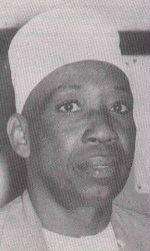
Shaaban bin Robert, also known as Shaaban Robert, was a Tanzanian poet, author, and essayist who supported the preservation of Tanzanian verse traditions. Robert is celebrated as one of the greatest Tanzanian Swahili thinkers, intellectuals and writers in East Africa and has been called "poet laureate of Swahili" and is also known as the "Father of Swahili." He is also honoured as the national poet.

The University of Dar es Salaam (UDSM) is a public university located in Ubungo ward of Ubungo District in Dar es Salaam Region of Tanzania.. It was established in 1961 as an affiliate college of the University of London. The university became an affiliate of the University of East Africa (UEA) in 1963, shortly after Tanzania gained its independence from the United Kingdom. In 1970, UEA split into three independent universities: Makerere University in Uganda, the University of Nairobi in Kenya, and the University of Dar es Salaam.

Following Tanganyika's independence (1961) and unification with Zanzibar (1964), leading to the formation of the state of Tanzania, President Julius Nyerere emphasised a need to construct a national identity for the citizens of the new country. To achieve this, Nyerere provided what has been regarded by some commentators as one of the most successful cases of ethnic repression and identity transformation in Africa.
Edwin Semzaba was a Tanzanian novelist, playwright, actor and director. He wrote his works mainly in Swahili. He taught in the Department of Fine and Performing Arts at the University of Dar es Salaam, Tanzania, where he taught, among other courses, creative writing and acting. He won the first award of East African Writers awarded by the Institute of Swahili Research for his novel Funke Bugebuge and the "grandchildren's adventure book writing competition" awarded by the Swedish Embassy in Tanzania (2007).

Grace Akello is a Ugandan poet, essayist, folklorist, and politician. She is the Uganda Ambassador to India.
Ebrahim Hussein is a Tanzanian playwright and poet. His first play, Kinjeketile (1969), written in Swahili, and based on the life of Kinjikitile Ngwale, a leader of the Maji Maji Rebellion, is considered "a landmark of Tanzanian theater." The play soon became one of the standard subjects for exams in Swahili language in Tanzania and Kenya. By 1981, it had been reprinted six times.
Martha Mvungi, née Martha V. Mlangala is a Tanzanian writer in both Swahili and English.

Hussein Ali Mwinyi is the 8th president of Zanzibar. The son of former Tanzanian president Ali Hasan Mwinyi, he is a member of the Chama Cha Mapinduzi (CCM) political party.

Vanessa Hau Mdee, is a Tanzanian singer, rapper, television personality and radio host. Mdee is popularly known for being the first ever Tanzanian MTV VJ. She later rose to prominence as a radio and TV host, hosting Epic Bongo Star Search and Dume Challenge for ITV Tanzania before signing to B'Hits Music Group in late 2012.
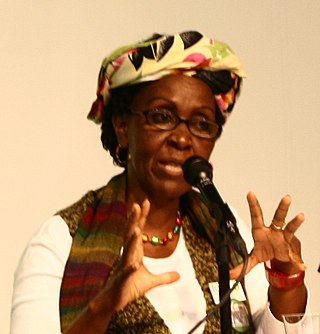
Elieshi Lema is a Tanzanian writer and publisher, also active in Tanzania's civil society.

Jokate Mwegelo is a Tanzanian politician and the District Commissioner for Korogwe District in Tanzania.
Farouk Mohamedhusein Tharia Topan is the director of the Swahili Centre at the Aga Khan University. He is a specialist in the language and literature of the Swahili people. He has taught at the University of Dar es Salaam, the Institute of Ismaili Studies, and the School of Oriental and African Studies.
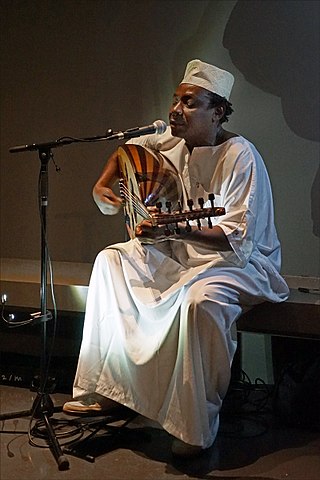
Mohamed Issa Haji 'Matona is a Zanzibarian musician. He is a founder and the artistic director of Zanzibar's Dhow Countries Music Academy.
Eunice Musiime is a Ugandan lawyer, feminist and development specialist. She is the current Executive Director of Akina Mama wa Afrika (AMwA). She is also the chairperson of the Federation of Uganda Women Lawyers (FIDA). In January, 01, 2005, she wrote a frame work report on Organic Agriculture in Uganda with other two authors; Boaz Keizire and Moses Muwanga.
Ruth E. Meena is a Tanzanian feminist activist and political scientist. She was a professor in the Department of Political Science and Public Administration at the University of Dar es Salaam.

Mkunde Chachage is a lecturer and researcher in immunology at University of Dar es Salaam Mbeya College of Health and Allied Sciences. She is also a researcher at the National Institute for Medical Research at Mbeya medical research centre. She conducts research in clinical immunology as well as infectious diseases of human including Tuberculosis (TB), HIV and helminths infections.
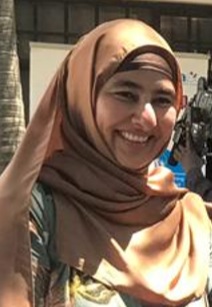
Nahida Esmail is a Tanzanian author and poet. She is a lifetime sponsor of 'The Teen Writers Awards'.
